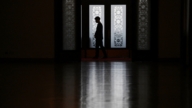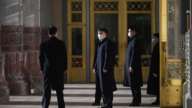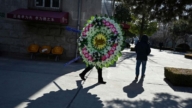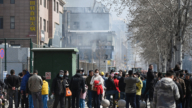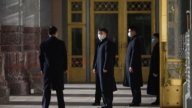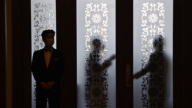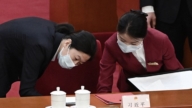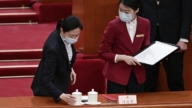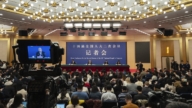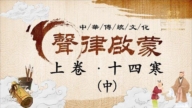【新唐人2012年1月14日讯】大陆各地举行地方两会,最近几天传出多位民主人士被抄家传唤﹔多地访民为表达诉求,遭到强制驱赶和拘押。民众表示,两会年年开,年年镇压。民主人士认为,这是当局政治体制陷入困境的反应。
大陆各省新一届地方两会都集中在近期举行。随着地方两会的陆续召开,各地访民希望借此机会,向中共人大以及中共政协委员们表达诉求,争取自己的合法权益。
上海两会11号在浦东国际会议中心召开,当天,数百名上海访民前往会场递交请愿书。结果,访民们刚出了地铁车站就遇到上百警察拦截,既不让他们递交请愿书,也不让他们诉说当地官员拆迁违法的事。随后,约300名访民被押送到上海府村路的黑监狱关押。
12号,再有数百名访民到上海两会现场请愿,当局出动大批警察拦截,有一些访民同样遭到关押。
上海访民金月花表示,上海访民十几年的冤情,得不到法院的立案和理睬。中共官员所挥霍的一切,包括地上、地下都是老百姓的血和泪筑成的,现在反而把老百姓赶尽杀绝。
金月花:“现在我们那个黑监狱就是很恐怖的,因为抓进去的时候,没有一个凳子,我们就坐在地上,上海现在正好是寒冬腊月的时候,那么冷的天,我们每一个人就坐在地上。就是我们这些人被他们折磨的,有的高血压,有的糖尿病,有的残疾,就这样一个屋子住。”
金月花还说,年年开两会,年年镇压,口头上说一套,背后上做一套,实际上又是一套。
金月花是因为自家的房子在2000年的时候,被上海闵行房地产发展有限公司拆迁,268.6平方米营业面积及222.6平方米土地使用权面积的财产,没有得到分文补偿安置。金月花多次向当地政府及有关部门投诉,都没有结果,反而遭到非法拘留和黑监狱关押。
另外,大陆维权人士这几天也陆续受到当局不同程度的打压。北京社会活动家胡佳、浙江民主人士邹巍、吕耿松、魏桢凌等先后遭当局的抄家和传唤。
11号早上8点左右,邹巍被守候在他家附近的协警挡住,十多个国保和派出所警察冲进他的家中,抄走了邹巍的电脑等东西,随后邹巍被带到派出所审问,直到12号上午才被释放回家。
同一天的晚上,北京社会活动家胡佳的住所,同样遭到当局抄家,警察带走两台电脑。胡佳还被北京市公安局通州分局传唤,经过两轮问讯,目前胡佳已经回到家中。
对于当局的这种行为,胡佳表示,当局是在为两会乃至即将召开的十八大进行舆论清场。
浙江民主人士邹巍表示,大陆现在社会矛盾激化,又逢十八大换届,当局在政治改革停滞不前的时候,只好严令各级公安机关,进行所谓的维稳。
邹巍:“那么在维稳这么一个僵化思想的推动下,它把社会的种种矛盾,社会矛盾产生的根源都怪罪于…民主异议份子的存在。在此情况下,特别是十八大换届前夕,加紧了对各地异议份子的高压政策。”
邹巍认为,民主自由的权利是属于每一个人的,虽然在大陆遭到当局的打压,但他所作的一切都是符合人的良知和道德。
邹巍特别指出,中共现在是做困兽之斗,要解决这种困境,唯一的办法就是推行政治改革,促进民主。
新唐人记者唐睿、郭敬采访报导。
Chinese Government Makes Arrests and Raids Homes during the “Two Sessions"
Local People’s Congress and People’s Political Consultative
Conference of the Chinese Communist Party (CCP) are being held across China,
and many Democrats were arrested and
expelled from their homes during raids.
Petitioners were driven away or detained when they
expressed their demands.
Many people say the “two sessions" are held every year,
and CCP suppresses people continually.
Democrats speculate that this is a sign showing the current
political system is in trouble.
The province level’s “two sessions" are being held during
these days, and the petitioners in different regions want to
use this chance to express their demands to the two sessions’
members, and to ask for their legitimate rights and benefits.
The two sessions of Shanghai were held in Pudong on January
11th, on which day hundreds of petitioners showed up planning to hand in their petitions.
But they met hundreds of police when they arrived at the
metro station.
The police didn’t allow them to hand out anything, nor to
speak out about the illegal demolitions by local officials.
Subsequently, about 300 petitioners were arrested and
put into a black prison in Fucun Road.
On the second day, another hundreds of petitioners were
met by a large number of police, and were jailed in the same prison.
Jin Yuehua, a petitioner, said Shanghai petitioners have a
decade of grievances, but the court hasn’t set up a file and has ignored their requests.
What CCP officials’ are spending is the blood and tears of the
common people, But they do nothing for them and even want to kill them.
Jin Yuehua: “The black prison is horrible.
Now it’s very cold in Shanghai, but there’s no chair in the room
so we had to sit on the floor.
There’s torture; some of us have very high blood pressure,
some diabetes, and some are disabled.
Many of us were forced to stay in one room."
Jin Yuehua said that there’s two sessions every year, and year
after year the suppression is during the same period.
CCP officials said one thing, but did another.”
Jin Yuehua’s house was demolished by Shanghai Minhang
Real Estate Development Co., in 2000.
The house is 268.6 m2 with another 222.6 m2 land, but she
didn’t receive a penny of compensation.
Jin Yuehua asked the local government and related
departments to help, yet received nothing but illegal detentions in black prisons.
During this period, many Chinese activists were suppressed
by the regime, including Beijing activist Hu Jia, Zhejiang democrat
Wei Zou, Lv Gengsong and Wei Zhenling; many activists’ homes
were raided and they were summoned.
At 8:00 am on January 11th, Zou Wei faced a dozen police
and security officers when he opened the door.
They broke into his home and grabbed his laptop and other
possessions.
Zou Wei was taken to the police office until the next morning.
In the evening, Beijing activist Hu Jia had the same experience.
The police grabbed his two computers and summoned him
to the Tongzhou Branch of the Beijing Police Bureau.
After two rounds of inquiries, he was released.
Hu Jia said, the authority’s behavior is to stifle public opinion
during the two sessions and the upcoming 18th National Congress.
Zou Wei, a Zhejiang democrat, said the social conflicts are
intensifying as the 18th National Congress approaches.
The authorities haven’t had any progress with political reform,
so they order public security to maintain the so-called stability.
Zou Wei:”The maintenance of stability is promoted under
that kind of rigid thinking.
The authority blamed the democratic dissidents for the
root of social conflicts.
In this circumstance, especially before the 18th National Congress,
they tightened suppression of dissidents.”
Zou Wei believes that the rights of democracy and freedom
belong to everyone.
Although there’s suppression in Mainland China, what he did
is in line with people’s conscience and morality.
Zou Wei pointed out that CCP is fighting like a trapped beast.
The only way to solve current issues is to implement
political reform and promote democracy.
NTD Reporters: Tang Rui and Guo Jing.


